Joe Lieberman, 3 others meet with Trump about FBI director job
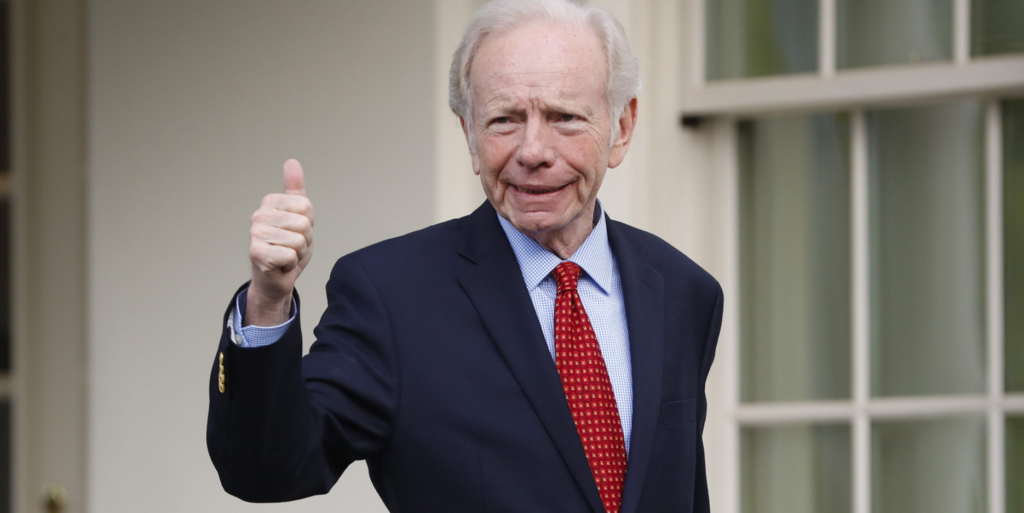
Four potential candidates to lead the FBI – including former Connecticut Sen. Joe Lieberman – have met with President Donald Trump and Attorney General Jeff Sessions. Former Oklahoma Gov. Frank Keating; Andrew McCabe, currently the bureau’s acting director; and Richard McFeely, a former top FBI official, also went to the White House for interviews on Wednesday. The meetings came more than a week after Trump fired James Comey from his post as FBI director. Trump said Monday that the search for a successor to Comey was “moving rapidly.” He also has said he could name a candidate by the end of the week, before he departs Friday afternoon on his first overseas trip as president. The Senate must confirm whoever Trump nominates. Press Secretary Sean Spicer informed reporters about the meetings as Trump flew to Washington after addressing U.S. Coast Guard Academy graduates in Connecticut. Asked as he left the White House whether he would say ‘yes’ if Trump offered him the job, Keating said, “I’m a public servant.” He added, “Let’s just say we had a good conversation.” Lieberman gave a thumbs-up to reporters camped out on the White House driveway and said “It was a good meeting.” McFeely departed without comment. Reporters did not see McCabe when he left the complex. Lieberman served in the Senate for more than two decades and was the Democratic vice presidential nominee in 2000 with then-Vice President Al Gore. Lieberman lost his 2006 Democratic primary bid but won Senate re-election as a third party candidate. Lieberman spoke at the 2008 Republican National Convention on behalf of his friend, Arizona Sen. John McCain, and did not seek re-election in 2012. He has served as co-chairman of No Labels, a centrist group that promotes bipartisanship. Keating, a Republican, was a two-term governor of Oklahoma and led the state during the deadly 1995 bombing of a federal building in Oklahoma City. A former FBI agent, Keating served in the administrations of Presidents Ronald Reagan and George H.W. Bush. McCabe became acting director following Comey’s dismissal on May 9. The veteran FBI official made headlines for congressional testimony last week that rejected the White House’s claim that Comey had lost the support of rank-and-file agents. He also disputed the administration’s characterization of an investigation into potential coordination between Russia and the Trump White House. Several other candidates have withdrawn from consideration, including Rep. Trey Gowdy of South Carolina and Sen. John Cornyn of Texas, both Republicans; Alice Fisher, the former head of the Justice Department’s criminal division; and Michael Garcia, a former U.S. attorney from Manhattan. Republished with permission of the Associated Press.
GOP candidate for FBI says no special counsel for inquiry
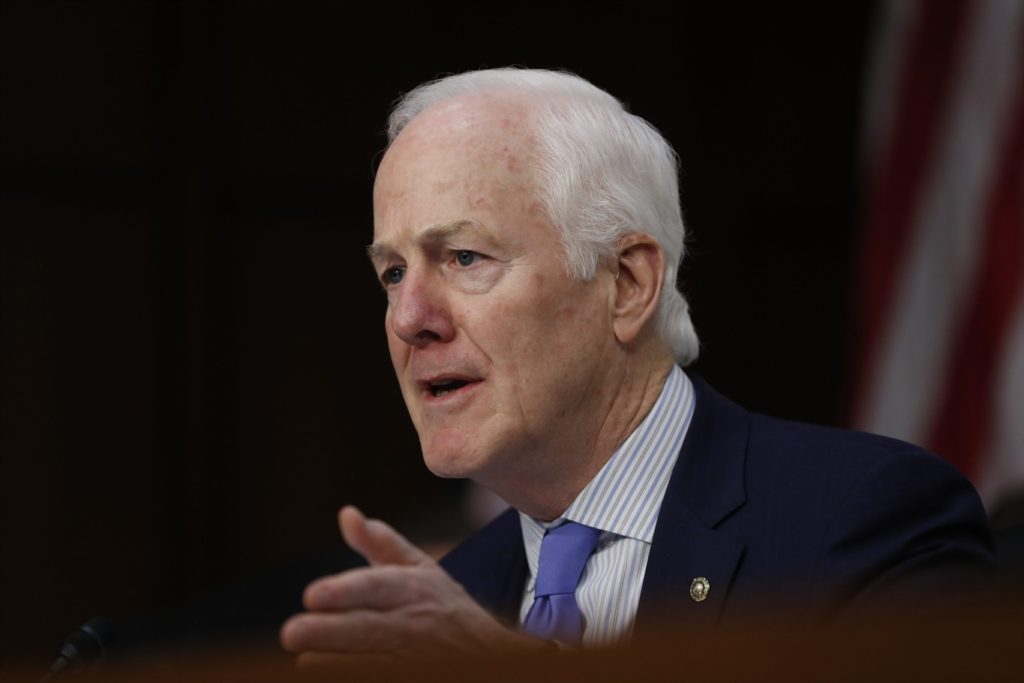
Texas Sen. John Cornyn, one of several candidates President Donald Trump is considering to replace fired FBI Director James Comey, sees no need for a special counsel to investigate possible collusion between Russia and the Trump campaign. Last year, though, Cornyn said an independent prosecutor was necessary to investigate Democrat Hillary Clinton and her email practices. His position echoes that of most of the Senate GOP caucus. Cornyn is the Senate majority whip and the No. 2 Republican, a job that often puts him in the position of speaking for the party and defending Trump. Republished with permission of The Associated Press.
Candidates under consideration for FBI director
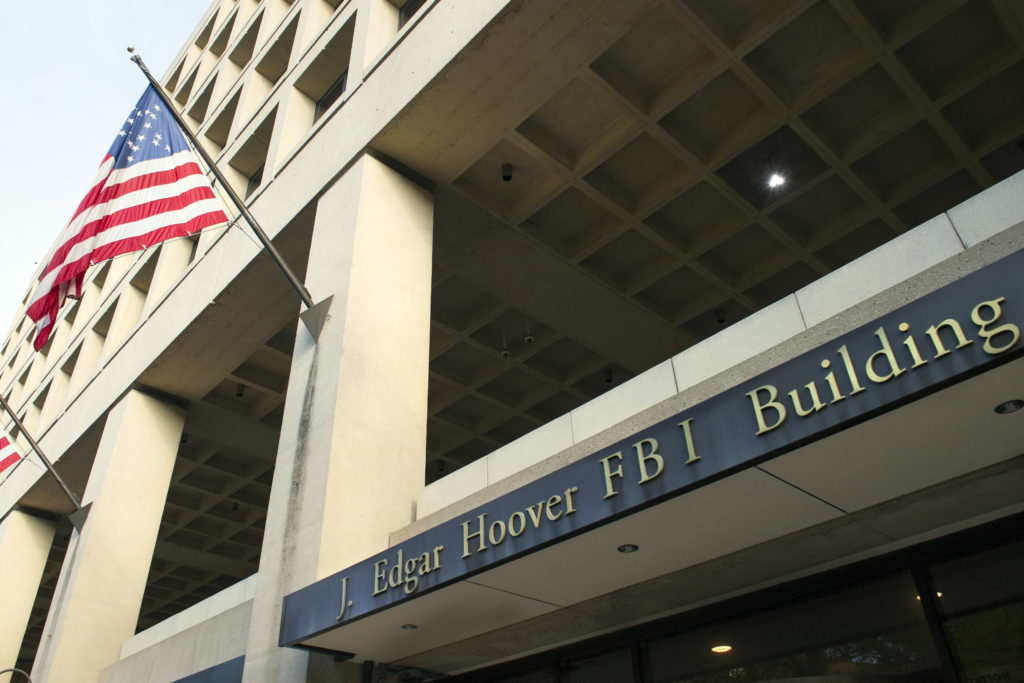
Candidates under consideration to replace fired FBI Director James Comey include a couple of sitting Capitol Hill lawmakers and the current acting director of the agency. SEN. JOHN CORNYN Cornyn is the No. 2 Senate Republican and a former Texas attorney general and state Supreme Court justice. He has been a member of the Senate GOP leadership team for a decade and serves on the Senate Judiciary Committee. In the aftermath of Comey’s dismissal, Cornyn said Trump was “within his authority” to fire him and said it would not affect the investigation of possible Russian ties to Trump’s presidential campaign. REP. TREY GOWDY The South Carolina Republican is best known for leading the congressional inquiry into the deadly attacks on a U.S. facility in Benghazi, Libya, a panel that oversaw a lengthy grilling of Hillary Clinton in 2015. A former federal prosecutor and state attorney, Gowdy was elected to Congress in the 2010 tea party wave and has focused on law enforcement issues. He originally endorsed Florida Sen. Marco Rubio for president before backing Trump in May 2016. FORMER REP. MIKE ROGERS Rogers is the former chairman of the House Intelligence Committee. He served Michigan in Congress for more than a decade before stepping down in 2015. Rogers worked for the FBI as a special agent based in Chicago in the 1990s and briefly advised Trump’s transition team on national security issues. His name was floated as a possible replacement for then-FBI Director Robert Mueller in 2013, and he received support from an association of FBI agents before President Barack Obama chose Comey. RAY KELLY Kelly was commissioner of the New York City Police Department for more than a decade, serving two mayors. In the aftermath of the 9/11 attacks, he created the first counterterrorism bureau of any municipal police department and oversaw a drastic reduction in crime. But Kelly also came under fire for his use of aggressive police tactics, including a program that spied on Muslims and a dramatic spike in the use of stop-and-frisk, which disproportionately affected nonwhite New Yorkers. J. MICHAEL LUTTIG Luttig, the general counsel for Boeing Corp., is viewed as a conservative legal powerhouse from his tenure as a judge on the 4th Circuit U.S. Court of Appeals and his time as a Justice Department lawyer. He was considered for two U.S. Supreme Court vacancies that went to Chief Justice John Roberts and Justice Samuel Alito. Luttig clashed with the George W. Bush White House on a prominent terror case, rebuking the administration for its actions in the case involving “enemy combatant” Jose Padilla. LARRY THOMPSON A deputy attorney general under President George W. Bush, Thompson served as the department’s No. 2 from 2001 to 2003. Among his most high-profile actions was allowing Syrian-born Canadian citizen Maher Arar to be deported to Syria, where he was tortured, after being falsely named as a terrorist. Thompson also served as U.S. attorney for the Northern District of Georgia and held several high-level positions at PepsiCo. PAUL ABBATE Abbate is a senior official at the FBI, currently responsible for the bureau’s criminal and cyber branch. He previously led FBI field offices in Washington, one of the agency’s largest, and in Detroit. He’s been deeply involved for years in FBI efforts to fight terrorism, serving in supervisory roles in Iraq and Afghanistan and later overseeing FBI international terrorism investigations as a section chief. He’s been with the FBI for more than 20 years, and is one of the FBI officials who interviewed this week for the role of interim director. ALICE FISHER Currently a partner at the law firm Latham & Watkins specializing in white-collar criminal and internal investigations, Fisher formerly served as assistant attorney general for the Criminal Division of the Justice Department. Fisher faced resistance from Democrats during her confirmation over her alleged participation in discussions about policies at the detention facility in Guantanamo Bay, Cuba. She also served as deputy special counsel to the Senate special committee that investigated President Bill Clinton’s Whitewater scandal. If selected, she would be the bureau’s first female director. ANDREW McCABE A Duke-educated lawyer, McCabe was named last year as the FBI’s deputy director, the No. 2 position in the bureau, overseeing significant investigations and operations. Since joining the FBI more than 20 years ago, he’s held multiple leadership positions, including overseeing the FBI’s national security branch and its Washington field office. McCabe became acting director after Comey was fired, but has shown a repeated willingness to break from White House explanations of the ouster and its characterizations of the Russia investigation. MICHAEL GARCIA A former New York prosecutor, Garcia has served as an associate judge on the New York Court of Appeals — the state’s highest court — since early 2016. He served as the U.S. attorney in Manhattan from 2005 to 2008, and previously held high-level positions in the Commerce Department, the Justice Department and the Department of Homeland Security. JOHN SUTHERS A former U.S. attorney and Colorado attorney general, Suthers was elected mayor of Colorado Springs in 2015. He is widely respected among state law enforcement and many Colorado Democrats. Suthers was inspired to become a prosecutor after he spent part of an internship in the Colorado Springs district attorney’s office watching the trial of a gang of soldiers convicted of killing various citizens, including actor Kelsey Grammer’s sister, during a crime spree in the 1970s. ADAM LEE Lee, a longtime agent, is special agent in charge of the FBI’s Richmond office. He worked in a variety of positions within the bureau. Before Comey tapped him to lead the Richmond office in 2014, he was section chief of the Public Corruption and Civil Rights Section, investigating some of the highest profile cases against government officials and civil rights violations in recent years. He also led the FBI’s global Foreign Corrupt Practices Act and Antitrust Programs. HENRY E. HUDSON Hudson is a federal judge in Richmond who earned praise from conservatives when he struck down the centerpiece
Illinois’ Dick Durbin says Donald Trump is ‘dangerous’
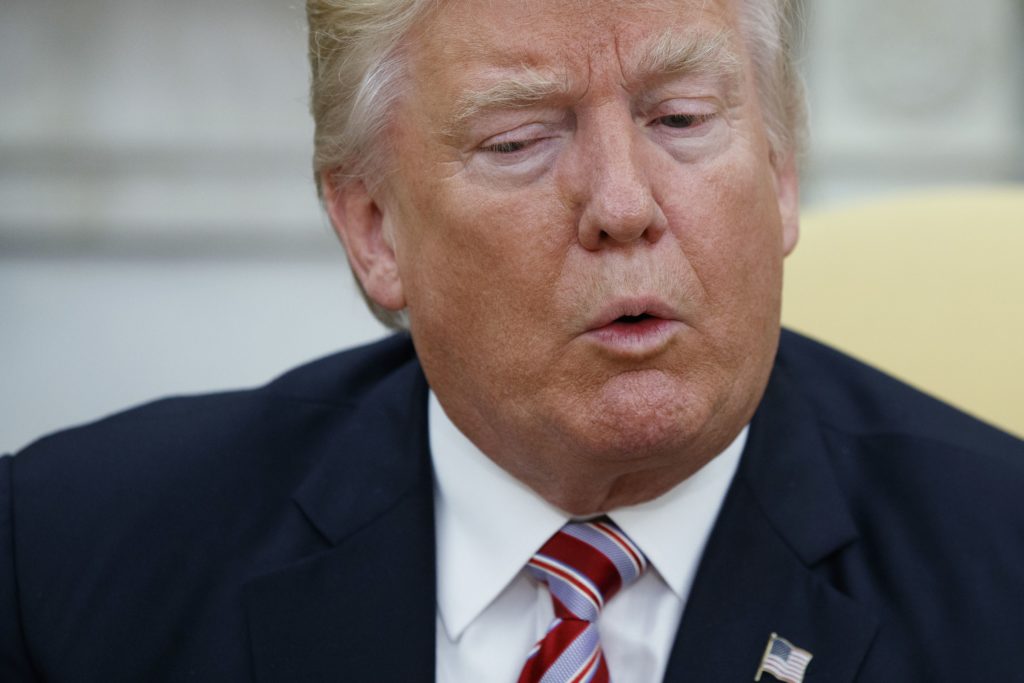
The Latest on President Donald Trump and the FBI (all times local): 11:10 a.m. The No. 2 Senate Democrat, Dick Durbin of Illinois, says President Donald Trump is “dangerous.” Durbin says Trump is “dangerous because he may be obstructing justice” in the investigation of Russia’s involvement in the 2016 election and possible ties to Trump’s own campaign. And, Durbin says, “his credibility has been destroyed.” Durbin says: “When you’re the leader of the free world you need to be credible” — in your own country and around the world. The Illinois Democrat says Trump has lost credibility, given his firing of FBI Director James Comey and a constantly shifting explanation for why it happened. Durbin made his comments Friday on “Morning Joe” on MSNBC. Piece by piece, the FBI’S Acting Director Andrew McCabe, during Senate testimony Thursday, undermined the White House’s explanations about Director James Comey’s firing. (May 11) ___ 10:10 a.m. President Donald Trump’s lawyers say a review of his last 10 years of tax returns do not reflect “any income of any type from Russian sources,” with some exceptions. The lawyers did not release copies of Trump’s tax returns so The Associated Press cannot independently verify their conclusions. The letter says there is no equity investment by Russians in entities controlled by Trump or debt owed by Trump to Russian lenders. It does reflect income from the 2013 Miss Universe pageant held in Moscow and a property sold to a Russian billionaire in 2008 for $95 million. The White House says Trump asked his lawyers for a letter following a request from Republican Sen. Lindsey Graham of South Carolina, who heads one of the congressional committees investigating Russia’s interference in last year’s election. ___ 8:45 a.m. President Donald Trump is warning that former FBI Director James Comey “better hope” that there are no “tapes” of their conversations. Trump tweeted Friday, “James Comey better hope that there are no ‘tapes’ of our conversations before he starts leaking to the press!” Trump fired Comey on Tuesday, later saying that “he wasn’t doing a good job.” In the termination letter to Comey, Trump thanked him for telling the president “three times” that he personally is not under investigation for collusion with Russia during his 2016 campaign. Trump said in an NBC News interview Thursday that Comey told him once over dinner and twice by telephone that he isn’t under investigation. Comey has not commented since he was fired. ___ 8:30 a.m. President Donald Trump is reiterating his view that reports about collusion with the Russian government by members of his 2016 campaign are “fabricated.” The president tweeted early Friday that “Again, the story that there was collusion between the Russians & Trump campaign was fabricated by Dems as an excuse for losing the election.” He added, “The Fake Media is working overtime today!” In an interview with NBC News Thursday, Trump said he asked FBI Director James Comey point-blank if he was under investigation and was assured three times he was not. Trump sent Comey a letter Tuesday firing him. In it, he thanked Comey for the three assurances. Trump showed no concern that the request might be viewed as interference in an active FBI probe. ___ 8:20 a.m. President Donald Trump says his busy schedule makes it “not possible” for his staff to speak at the podium with “perfect accuracy.” Trump on Friday defended the struggle by his administration to come up with a consistent timeline and rationale for the abrupt firing of FBI Director James Comey this week. Trump tweeted, “As a very active President with lots of things happening, it is not possible for my surrogates to stand at podium with perfect accuracy!” He added, “Maybe the best thing to do would be to cancel all future ‘press briefings’ and hand out written responses for the sake of accuracy???” The president’s advisers said Trump fired Comey in response to a recommendation by Deputy Attorney General Rod Rosenstein, then said Trump had planned to fire Comey regardless. ___ 3:45 a.m. President Donald Trump is contradicting previous White House explanations for the firing of James Comey as FBI director. Trump says in an interview with NBC News that he had planned to fire Comey all along, regardless of the recommendations of top Justice Department officials. Initially the White House cited a Justice Department memo criticizing Comey’s handling of last year’s investigation into Hillary Clinton’s emails as the impetus for Trump’s decision. On Capitol Hill, acting FBI Director Andrew McCabe strongly disputed the White House’s assertion that Comey had been fired in part because Comey had lost the confidence of the FBI’s rank-and-file. In the NBC interview, Trump derided Comey as a “showboat” and “grandstander” and said Comey had left the FBI in “virtual turmoil.” Republished with permission of The Associated Press.
Donald Trump to James Comey: Better hope there are no ‘tapes’ of talks

President Donald Trump, in an apparent warning to his fired FBI director, said Friday that James Comey had better hope there are no “tapes” of their conversations. Trump’s tweet came the morning after he asserted Comey had told him three times that he wasn’t under FBI investigation. “I said, ‘If it’s possible, would you let me know, am I under investigation?’ He said you are not under investigation,” Trump said in an interview Thursday with NBC News. He said the discussions happened in two phone calls and at a dinner in which Comey was asking to keep his job. Comey has not confirmed Trump’s account. Late Thursday, The New York Times cited two unnamed Comey associates who recounted his version of a January dinner with the president in which Trump asked for a pledge of loyalty. Comey declined, instead offering “honest.” When Trump then pressed for “honest loyalty,” Comey told him, “You will have that,” the associates said. White House spokeswoman Sarah Huckabee Sanders disputed the report and said the president would “never even suggest the expectation of personal loyalty.” Officials did not immediately respond to questions about whether Trump recorded his discussions with the FBI director. The president’s morning Twitter comments again raised the specter of Richard Nixon, who secretly taped conversations and telephone calls in the White House during the Watergate investigation that ultimately led to his downfall. Trump’s firing of Comey already has left him with the dubious distinction of being the first president since Nixon to fire a law enforcement official overseeing an investigation tied to the White House. Even before Trump’s provocative tweet, the White House was scrambling to clarify why Comey was fired. Trump told NBC he had planned to fire Comey all along, regardless of whether top Justice Department officials recommended the stunning step. The White House initially cited a Justice Department memo criticizing Comey’s handling of last year’s investigation into Hillary Clinton‘s emails as the impetus for Trump’s decision. But Trump on Thursday acknowledged for the first time that the Russia investigation — which he dismissed as a “made-up story” — was also on his mind as he ousted the man overseeing the probe. The shifting accounts of the decision to fire Comey, whom Trump derided as a “showboat” and “grandstander,” added to a mounting sense of uncertainty and chaos in the West Wing, as aides scrambled to get their stories straight and appease an angry president. Not even Vice President Mike Pence was spared the embarrassment of having told a version of events that was later discredited by Trump. The White House’s explanations continued to crumble throughout the day Thursday. On Capitol Hill, acting FBI Director Andrew McCabe strongly disputed the White House’s assertion that Comey had been fired in part because he had lost the confidence of the FBI’s rank-and-file. “That is not accurate,” McCabe said. “Director Comey enjoyed broad support within the FBI and still does to this day.” Unfazed, Sanders insisted she had heard from “countless” members of the FBI who welcomed the president’s decision. McCabe also pointed out the remarkable nature of Trump’s version of his conversations with Comey. McCabe told a Senate panel it was not “standard practice” to tell an individual whether they are or are not under investigation. Previous presidents have made a public show of staying out of legal matters, so as not to appear to be injecting politics. Trump’s comments demonstrated his striking deviation from that practice. The ousted director himself is said to be confident that his own version of events will come out, possibly in an appearance before Congress, according to an associate who has been in touch with him since his firing Tuesday. Trump and Comey’s relationship was strained early on, in part because of the president’s explosive and unsubstantiated claims that Barack Obama wiretapped Trump Tower. Comey found the allegations confounding, according to his associate, and wondered what to make of what he described as strange thoughts coming from his new boss. The president was no kinder to Comey on Thursday, calling him names and saying he’d left the FBI in “virtual turmoil.” He said that while he received a scathing assessment of Comey’s performance from Deputy Attorney General Rod Rosenstein on Monday, that memo was not a catalyst for his dramatic decision as the White House had said earlier. “I was going to fire Comey,” Trump said. “Regardless of recommendation, I was going to fire Comey.” That’s far different from the White House’s initial account in the hours after Comey’s firing. Multiple officials, including Pence, said the president was acting at the behest of Rosenstein and Attorney General Jeff Sessions. But it quickly became clear that the president had been stewing for days over the Russia investigation and Comey’s refusal to defend him in appearances before lawmakers. By Wednesday afternoon, the officials, like Trump, were saying he had in fact been considering ousting the FBI director for months because of a lack of confidence in his ability to lead the agency. And the Russia investigation was still on his mind. “In fact when I decided to just do it, I said to myself, I said you know, this Russia thing with Trump and Russia is a made-up story, it’s an excuse by the Democrats for having lost an election that they should have won,” he said. Sanders attributed the disconnect in the week’s explanations to the fact that she had not directly asked Trump when he’d made the decision to fire Comey until shortly before Thursday’s press briefing. White House officials and others insisted on anonymity in order to disclose private conversations and internal deliberations. The White House said Trump is weighing options for replacing Comey, a decision that could have broad implications for the future of the Russia investigation. Some senior officials have discussed nominating Rep. Trey Gowdy, the South Carolina Republican who ran the House committee that investigated Secretary of State Hillary Clinton’s actions in connection with the 2012 attack on a U.S. compound
Donald Trump fires FBI director James Comey

President Donald Trump has fired FBI Director James Comey. In a statement, Trump says Comey’s firing “will mark a new beginning” for the FBI. The White House says the search for a new FBI director will begin immediately. Comey’s firing comes days after he testified on Capitol Hill about the FBI’s investigation into Russia’s election meddling and possible connections between Russia and Trump’s campaign. Republished with permission of The Associated Press.
Can hack but not shoot? FBI may ease entry for cyber agents
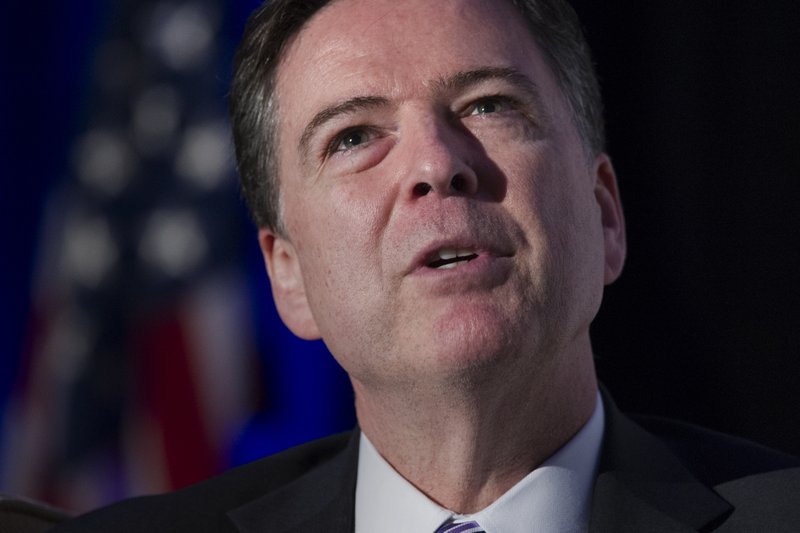
Aspiring federal agents who can hack a computer with ease but can’t shoot their way out of a paper bag could soon find the FBI to be more welcoming. In a series of recent speeches, FBI Director James Comey has hinted the bureau may adjust its hiring requirements to attract top-notch cyber recruits, the better to compete with private sector companies who can lure the sharpest technical minds with huge salary offers. He’s floated the idea of scrapping a requirement that agents who leave the FBI but want to return after two years must re-enroll in the bureau’s storied but arduous Quantico, Virginia, training academy. He’s also lamented, half-jokingly, that otherwise qualified applicants may be discouraged from applying because of a fondness for marijuana. “We will find people of integrity who are really smart, who know cyber — and can’t do a pushup. Or we’ll find people, maybe they can do a pushup, they’re smart and they can do cyber — but they want to smoke weed on the way to the interview,” the FBI director has said. The rethinking on recruitment comes as the FBI confronts increasingly complex cyber challenges, including crippling state-sponsored attacks, and as it’s racing to develop more sophisticated techniques for combating internet-based threats. Law enforcement has struggled to break into encrypted cellphones of criminal suspects and the Justice Department sued Apple last year after agents could not access a locked iPhone used by a mass shooter in San Bernardino, California. Though an unidentified third-party vendor ultimately came forward with a tool to open the phone, law enforcement officials remain concerned about electronic terrorism recruitment that occurs through encrypted channels and out of sight of investigators. Even crimes that investigators have tackled for decades, like child pornography, have grown more complicated as suspects trade images through hidden internet browsers that shield their locations and identities. The Justice Department has been developing ways through bulk hacking to uncover the users’ locations, though defendants have repeatedly — and with some success — challenged the use of that tactic. “The world’s not coming back. The old school stuff that I did 20, 30 years ago in the State Police and the FBI, all those crimes nowadays have a major cyber component to it,” said Robert Anderson, a retired FBI executive assistant director who oversaw cyber investigations. Comey has suggested the FBI may need to build its own university to groom cyber talent and questioned whether every member of a cyber squad actually needs to be a gun-carrying agent. “Our minds are open to all of these things because we are seeking a talent — talent in a pool that is increasingly small. So, you’re going to see us experiment with a number of different approaches to this,” Comey said last week at a gathering of the Intelligence and National Security Alliance. He’s floated different possible solutions, but he’s returned several times to the idea of waiving the requirement that people who want to return to the FBI after two years outside the bureau re-enroll in Quantico. “Our people leave, go to the private sector, discover it’s a soulless, empty way to live — and then they realize, ‘My life is empty, I need moral content in my work,’” Comey said, light-heartedly and to laughter, in a recent speech at the University of Texas at Austin. He added: “I gave the creds for the second time to a 42-year-old cyber agent, and I said, ‘So, how was Quantico?’ He said, ‘It was a nightmare, it was a nightmare.’ And so we’re trying to figure out, are there ways we should approach this differently to recognize the challenge we have in attracting talent?” Comey made headlines on the topic in 2014 when, in response to a question, he said that a prospective candidate who had previously smoked marijuana should go ahead and apply anyway. FBI rules disqualify applicants who have smoked marijuana within the last three years, and there’s been no sign that that policy will change. He was chastised soon at a Senate Judiciary Committee hearing by then-Sen. Jeff Sessions, now the United States attorney general and Comey’s boss, about whether he understood that those comments could “be interpreted as one more example of leadership in America dismissing the seriousness of marijuana use.” Comey replied that he had tried to be “both serious and funny” and was merely remarking on the FBI’s challenges in developing a cyber workforce at a time when “more and more” young people were trying marijuana. He pronounced himself “absolutely dead-set against using marijuana” and noted that he had not said that he would change the FBI’s policy. Anderson said, “Anything new in the government is like getting your wisdom teeth pulled out. Anything new takes a while for the culture of the FBI to adjust to it.” But, he added, “If the strategic vision is to create a mecca for cyber, we’re going to have to change.” Republished with permission of The Associated Press.
Analysis: Reality catching up with Donald Trump on Russia
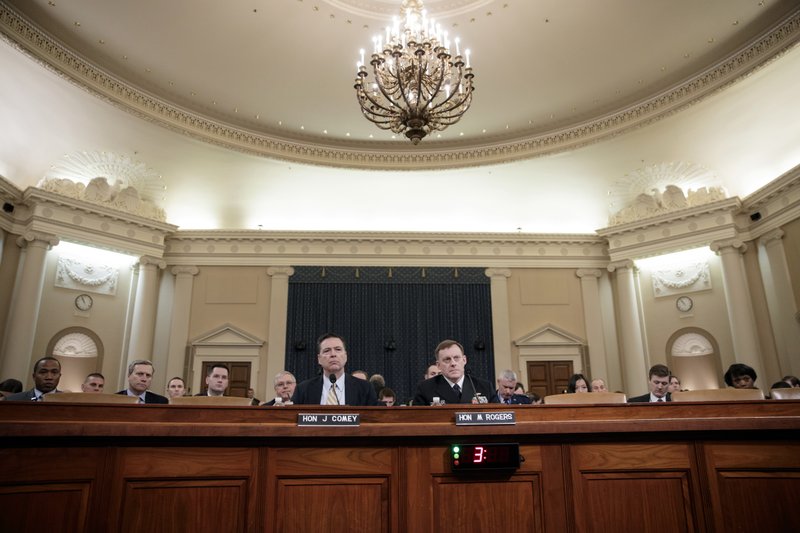
Reality is catching up with President Donald Trump. Hours after Trump dismissed reports that his campaign associates were being scrutinized for colluding with Russia as “fake news,” FBI Director James Comey confirmed the investigation is real. The FBI chief also repeatedly insisted there was no evidence to back up Trump’s explosive claim that his predecessor wiretapped his New York skyscraper. And Adm. Michael Rogers, head of the National Security Agency, knocked down a report about Britain helping President Barack Obama with the alleged surveillance, although the White House had pointed to the report to try to boost Trump’s case. Taken together, the disclosures in Monday’s lengthy House intelligence committee hearing amounted to an extraordinary undercutting of a president, whose headline-grabbing accusations and Twitter-friendly attacks crumbled quickly under the weight of sworn congressional testimony from some of the nation’s top security officials. Many of Trump’s most ardent supporters are unlikely to be swayed by Monday’s spectacle. Still, Trump’s credibility and his standing as a reliable ally for his fellow Republicans in Congress are less assured. Even if his advisers are ultimately cleared in the Russia probe, as the White House insists they will be, the investigation could loom over Trump’s presidency for months or even years, distracting from the ambitious domestic agenda he’s vowed to enact. That reality was abundantly clear Monday. Most cable news channels carried Comey and Rogers’ five hours of testimony live instead of the first congressional hearing for Neil Gorsuch, Trump’s widely praised nominee for the Supreme Court. The Russia hearings came as Trump tried to give a hard sell to Republicans wary of his health care package, a legislative gamble with long-lasting implications for Trump’s relationship with his own party. The president’s political position was already shaky heading into Monday’s hearing, the first of several public sessions the House and Senate intelligence committees are expected to hold. His approval rating has tumbled to 39 percent, according to a new Gallup poll, down 6 points from a week earlier. Trump has long been shadowed by questions about his ties to Russia, given his friendly posture toward Moscow and his advisers’ curious web of ties to Russia. The White House insists the campaign did not coordinate with Russia on the hacking of Democratic groups during the election and dismisses the swirling controversy as little more than a political witch hunt. Yet Monday’s hearings left the White House scrambling for cover, though there was little to be found. Spokesman Sean Spicer launched into a series of confounding arguments during his daily briefing. He touted statements from lawmakers and former Obama administration officials saying they had seen no evidence of collusion between Trump associates and Russia. But he dismissed nearly identical statements from some of those same officials about Trump’s wiretapping allegations, saying it was too early in the investigations to draw any conclusions. In one particularly eyebrow-raising moment, Spicer resorted to claiming one associate, Paul Manafort, had a “very limited role” in the 2016 election. In fact, Manafort was hired in March as Trump’s convention manager and promoted to campaign chairman in May. Spicer also described foreign policy adviser Michael Flynn as simply a “volunteer.” Flynn traveled frequently with the president, delivered a high-profile speech at the Republican National Convention and served as his first National Security Adviser. Both Manafort and Flynn were fired by Trump after revelations about their connections to Russia. Manafort left the campaign in August, when news reports about his business ties to pro-Moscow Ukrainian oligarchs became a political liability. Flynn was fired in February for misleading top officials about his contacts with Russia’s ambassador to the United States. Both Manafort and Flynn are among the Trump associates under scrutiny for possible contacts with Russia during the election. The Senate intelligence committee has also asked Roger Stone, a longtime Trump adviser, and Carter Page, an investment banker who briefly advised the campaign on foreign policy, to retain documents related to its inquiry. The White House, with the backing of some Republican lawmakers, says the real controversy is how the investigation into Trump’s advisers became public. They argue the focus of the probe should be ferreting out who leaked classified information. Trump tried to go on offense in the middle of the hearing, launching a series of tweets from his official White House account, including one that appeared to blame the Obama administration for leaking details of Flynn’s contacts with the Russian envoy. Another tweet incorrectly said Comey and Rogers told lawmakers that Russia “did not influence” the electoral process. In a moment of real-time fact-checking, the FBI director made clear that was not a declaration he had made. “We don’t have any information on that subject,” he said. Republished with permission of The Associated Press.
James Comey in middle of political fray over Donald Trump and Russians
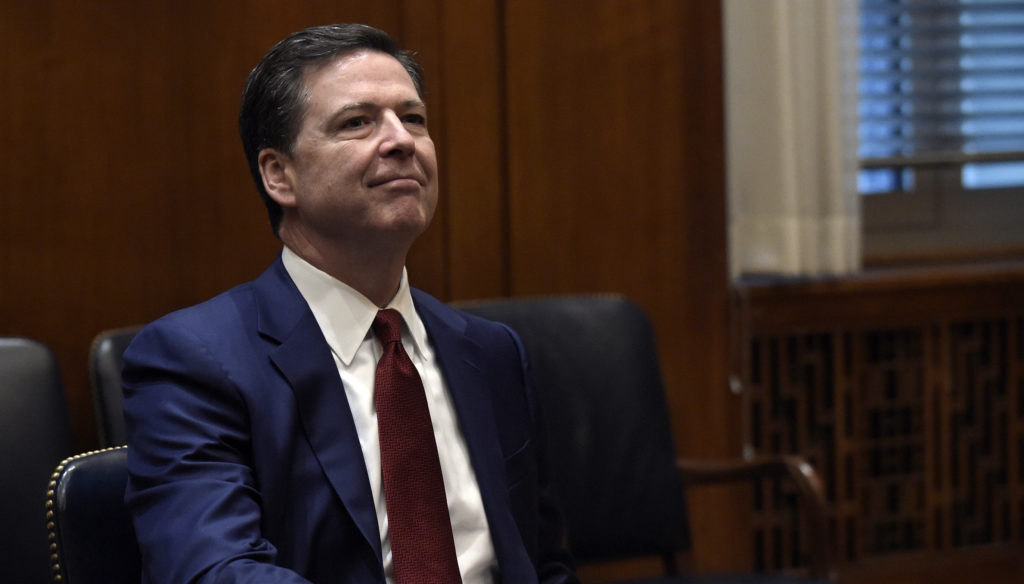
FBI Director James Comey is again in a familiar spot these days – the middle of political tumult. As a high-ranking Justice Department official in the George W. Bush administration, he clashed with the White House over a secret surveillance program. Years later as head of the FBI, he incurred the ire of Hillary Clinton supporters for public statements on an investigation into her emails. Now, Comey is facing new political pressure as White House officials are encouraging him to follow their lead by publicly recounting private FBI conversations in an attempt to dispute reports about connections between the Trump administration and Russia. It’s an unusual position for a crime-fighting organization with a vaunted reputation for independence and political neutrality. Yet Comey, the former top federal prosecutor in Manhattan who later became deputy attorney general of the United States, is known for an unshaking faith in his own moral compass. “I’m not detecting a loss of confidence in him, a loss of confidence in him by him,” said retired FBI assistant director Ron Hosko, noting the broad recognition that “these are very tumultuous, polarized, angry, angry times.” The latest flare-up occurred Friday, when White House officials told reporters that chief of staff Reince Priebus had asked top FBI officials to dispute media reports that Donald Trump‘s campaign advisers were frequently in touch with Russian intelligence agents during the election. The officials said the FBI first raised concerns about New York Times reporting but told Priebus the bureau could not weigh in publicly on the matter. The officials said Deputy Director Andrew McCabe and Comey instead gave Priebus the go-ahead to discredit the story publicly, something the FBI has not confirmed. As the FBI declined to discuss the matter, pressure mounted on Comey to either counter or affirm the White House’s account. Even the Trump administration urged him to come forward, which as of Friday was not happening. “Politicized assertions by White House chief of staff Priebus about what may or may not be the findings of an FBI investigation are exactly the wrong way for the public to hear about an issue that is of grave consequence to our democracy,” Sen. Ron Wyden, an Oregon Democrat and member of the Senate Intelligence Committee, said in a statement. “The American people deserve real transparency, which means Director Comey needs to come forward, in an open hearing, and answer questions.” The push on Comey to publicly discuss the bureau’s investigation of Russian interference in the 2016 presidential election is especially acute given his statements in the run-up to Nov. 8 that many Democrats believe cost Clinton the election. He detailed the results of the FBI’s investigation at an unusual July news conference, testified on it for hours on Capitol Hill and alerted Congress less than two weeks before Election Day that the FBI would be reviewing new emails potentially connected to the case. But it’s not clear that Comey, now in the fourth year of a 10-year term, will be swayed by any public hand-wringing. People who have worked with the FBI director describe him as holding strong personal convictions. As deputy attorney general, he confronted White House officials in the hospital room of then-Attorney General John Ashcroft in an effort to quash the reauthorization of a counterterrorism surveillance program. When nominating Comey for FBI director in 2013, President Barack Obama praised him for his “fierce independence and deep integrity.” Comey stood apart from the administration on a few occasions after that, including when he floated the possibility that police concerns over being recorded on video were causing officers to pull back and contributing to an uptick in homicides, a viewpoint the White House refused to endorse. His decision to announce the FBI’s recommendation against criminal charges in the Clinton email case was made without any notice to the Justice Department, and his notification to Congress about the new emails was not supported by department leaders, including Attorney General Loretta Lynch. Decisions that reach the desk of the top leadership of the FBI are generally not easy, said Robert Anderson, a retired FBI executive assistant director. “The director of the FBI is a hard job, even when it’s an easy day or nothing’s in the newspaper,” Anderson said. “By the time it makes it up to Jim, it’s all hard at that point.” Republished with permission of The Associated Press.
US gives detailed look at Russia’s alleged election hacking
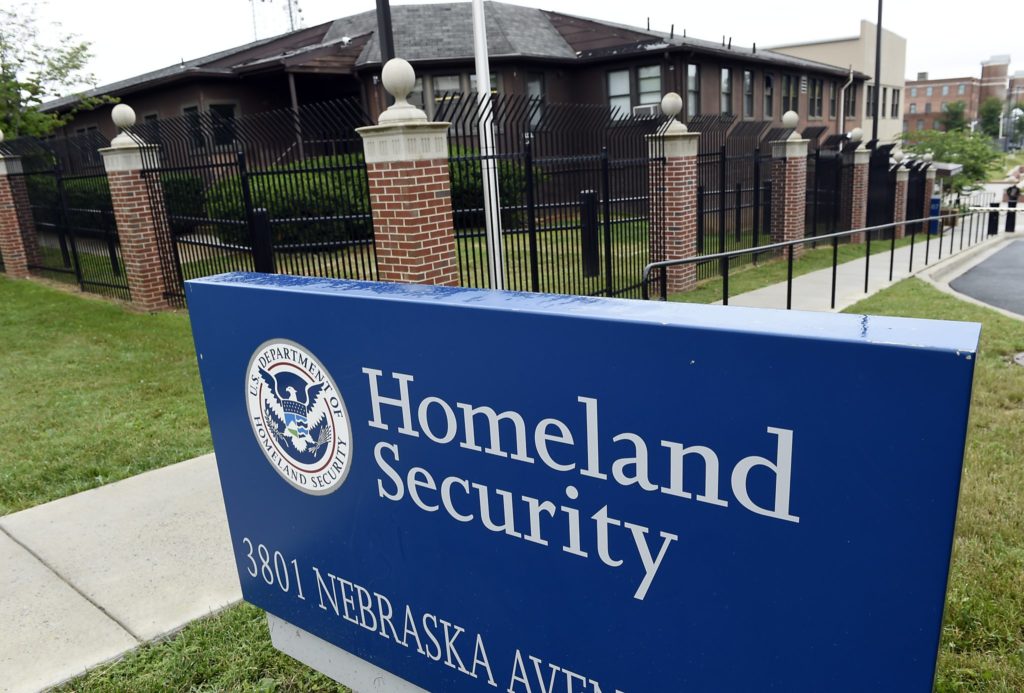
The U.S. has released its most detailed report yet on accusations that Russia interfered in the U.S. presidential election by hacking American political sites and email accounts. The 13-page joint analysis by the Department of Homeland Security and the FBI is the first such report ever to attribute malicious cyber activity to a particular country or actors. It was also the first time the U.S. has officially and specifically tied intrusions into the Democratic National Committee to hackers with the Russian civilian and military intelligence services, the FSB and GRU, expanding on an Oct. 7 accusation by the Obama administration. The report said the intelligence services were involved in “an ongoing campaign of cyber-enabled operations directed at the U.S. government and its citizens.” It added, “In some cases, (the Russian intelligence services’) actors masqueraded as third parties, hiding behind false online personas designed to cause the victim to misattribute the source of the attack.” Last summer, stolen emails from Democrats were posted by an online persona known as Guccifer 2.0, believed by U.S. officials to be linked to Russia. Outrage over documents that appeared to show favoritism for Hillary Clinton forced the DNC’s chair, Debbie Wasserman Schultz, to resign. The U.S. released the technical report Thursday as President Barack Obama sanctioned the GRU and the FSB, the GRU’s leadership and companies which the U.S. said support the GRU. The sanctions were the administration’s first use of a 2015 executive order for combatting cyberattacks against critical infrastructure and commercial espionage. Because election systems aren’t considered critical infrastructure, Obama amended the order Thursday to allow for sanctions on entities “interfering with or undermining election processes or institutions.” The retaliation against Russia, just weeks before President-elect Donald Trump takes office, culminated months of political handwringing about how and whether to respond to Moscow’s alleged meddling. U.S. intelligence agencies concluded that Russia’s goal was to help Trump win – an assessment Trump has dismissed as ridiculous. Trump said Thursday the U.S. should move on, but that he would meet with the intelligence community’s leaders next week for an update on the situation. The report did not go far beyond confirming details already disclosed by cybersecurity firm CrowdStrike, which was hired to investigate the DNC hacks. It described the intelligence services’ use of “spearphishing” – fake emails intended to trick victims into typing in their user names and passwords. At least one person opened attachments with malicious software. The report noted that actors “likely associated” with Russian intelligence services are continuing to engage in spearphishing campaigns, including one launched just days after the U.S. election. The DNC was infiltrated by the FSB in summer 2015 and again by the GRU in spring 2016 using spearphishing emails that often appeared to come from legitimate or official organizations, the report said. Russian officials have denied any involvement in hacking U.S. political sites and emails. The report provided clues, or pieces of code left behind by hackers, cybersecurity workers in the private sector could look for to identify compromised systems and prevent more intrusions. The Department of Homeland Security said it has already included this information within its own cyber threat information-sharing program, which automatically flags threats in real time for participating companies and agencies. Releasing such a report was a political twist on the administration’s strategy of “name and shame,” in place since 2012 and used to bring indictments against Chinese military hackers for economic espionage and Iranian hackers for an attack on banks and a small dam in New York. It was also a far more detailed and sophisticated telling of Russia’s hacking, with technical indicators of compromise, compared to the spare technical details released after the Obama administration publicly blamed North Korea for a cyberattack against Sony Pictures Entertainment. U.S. officials also provided antivirus vendors with two malicious software samples used by Russian intelligence services. Republished with permission of the Associated Press.
James Comey considered a ‘bad choice’ for FBI post by Hillary Clinton aide
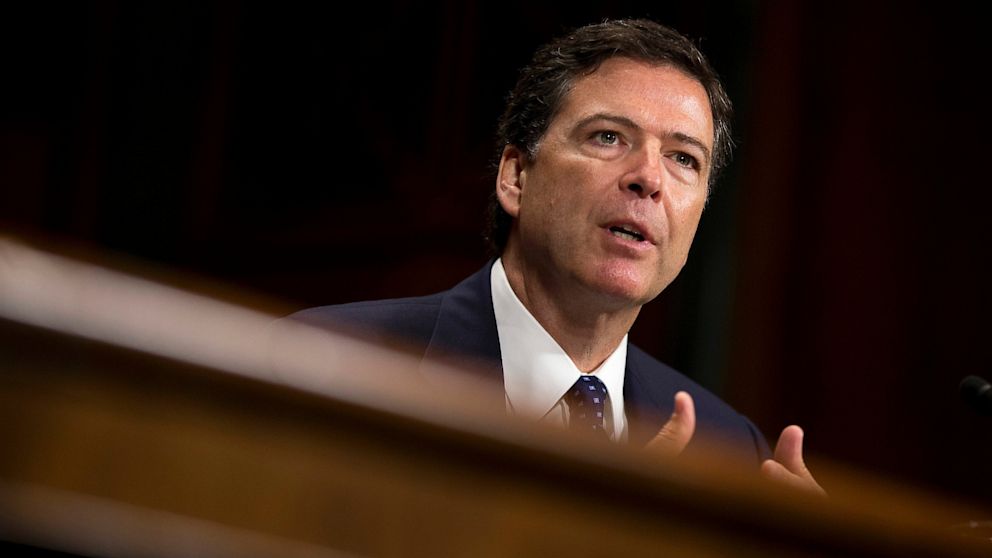
A senior aide to Hillary Clinton privately dismissed FBI Director James Comey as “a bad choice” in October 2015, according to newly released emails from WikiLeaks. The blunt assessment foreshadowed the dramatic tension that has escalated between Comey and the Democratic presidential candidate in the final days before the election. Clinton communications director Jennifer Palmieri forwarded to colleagues a news article in which the FBI director suggested that crime could be rising because police officers were becoming less aggressive as a result of the “Ferguson effect,” anti-police sentiment following unrest earlier that year in Ferguson, Missouri. Comey was widely criticized over the remarks. Palmieri wrote, “Get a big fat ‘I told you so’ on Comey being a bad choice.” She sent the email to Clinton’s campaign chairman, John Podesta, and to the private email address of someone who appeared to be White House spokesman Eric Schultz. Neither responded, and Palmieri did not appear to write further about the subject. Palmieri was the White House director of communications when Comey was appointed FBI director by President Barack Obama in September 2013. The release of the hacked email came days after Comey notified Congress that during an investigation of Clinton aide Huma Abedin‘s now-separated husband, former Rep. Anthony Weiner, FBI agents found indications that a laptop used by Weiner contained some emails related to the FBI’s earlier probe of Clinton’s private computer server and emails. The disclosure roiled the presidential campaign, and last week Palmieri openly criticized Comey about the notification. “By taking this highly unusual, unprecedented action this close to the election, he put himself in the middle of the campaign,” Palmieri said of Comey. Comey had announced in July that he was recommending against criminal charges in the investigation of Clinton’s use of her private server, but the FBI director also delivered blistering criticism that Clinton and her colleagues at the State Department were “extremely careless in their handling of very sensitive, highly classified information.” The Palmieri email was among more than 2,000 messages newly published Thursday by WikiLeaks. The emails were hacked from Podesta’s private account. The U.S. government has said the Russian government was responsible, although WikiLeaks founder Julian Assange said earlier in the day that no government or any other state parties had given the stolen emails to WikiLeaks. He offered no evidence to support his denials, and the wording of his statement did not rule out the possibility that the emails were obtained by a state actor and then provided to another party who then passed them to WikiLeaks. In another hacked email published Thursday, Palmieri told Podesta and longtime Clinton adviser Neera Tanden in June 2011 that it was time to “bust in that house and get Huma the hell out of there.” Palmieri was not explicit in the reference but it appears to have been prompted by the sexting scandal involving Weiner that forced him to resign from his New York congressional seat. Palmieri sent the email, which she titled “time to get in the hazmat suits,” the day before Weiner stepped down after admitting he had sent a sexually suggestive picture of himself to a 21-year-old woman over Twitter. A January 2016 email to Podesta included a message describing a pitch for a music television show involving former president Bill Clinton’s brother, Roger. “Think American Idol meets country music. A panel of judges will pick from the nation’s best undercover stars. Starring Roger Clinton,” said the message, forwarded to a Bill Clinton aide. The idea circulated to Hillary Clinton’s campaign aides, who refrained from commenting. Another email revealed that appearing on the season opener of “Saturday Night Live” took precedence over delivering the keynote dinner address for the annual gala of the Human Rights Campaign, the nation’s largest LGBT rights group – at least in the minds of Clinton’s campaign aides. Lining up an appearance on “SNL” was the Clinton campaign’s top effort for the fall 2015 television season. The campaign’s deputy communications director, Kristina Schake, called a “surprise guest spot” on the comedy series’ Oct. 3 show the “top ask” among television venues. “Talked to the producers,” Schake wrote in an email dated Aug. 6, 2015. “They will write a skit for her and want to confirm asap. Would need to skip the HRC Gala in DC that night, but this opportunity seems more important given the impact it would have.” As it turned out, Clinton managed to deliver a keynote address for the HRC gathering after all – during its Saturday breakfast in Washington. Vice President Joe Biden was the dinner’s keynote speaker. Clinton traveled to New York to appear on “SNL” as hoped, playing a bartender named Val who commiserates with Kate McKinnon‘s Clinton. Other TV shows the campaign sought for Clinton appearances, according to the email: “The Tonight Show Starring Jimmy Fallon,” ”The Late Show with Stephen Colbert, “Jimmy Kimmel Live,” ”Live with Kelly and Michael,” Charlie Rose‘s talk show and “CBS This Morning.” Republished with permission of the Associated Press.
Donald Trump: ‘Here we go again’ with Hillary Clinton scandal cycle
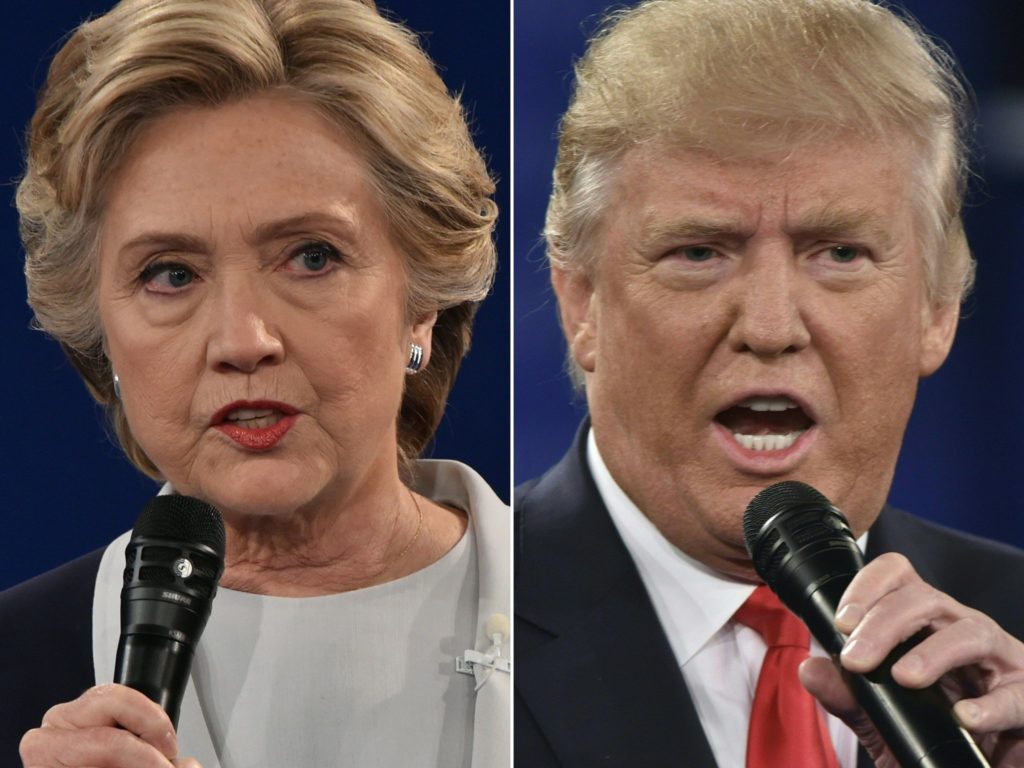
Donald Trump warned on Thursday that a cloud of investigation would follow Hillary Clinton into the White House, evoking the bitter impeachment battle of the 1990s in a closing campaign argument meant to bring wayward Republicans home. Clinton and her allies, led by President Barack Obama, told voters to get serious about the dangers of Trump. As polls show Trump closing in on Clinton in key battleground states, her campaign is rushing to shore up support in some long-standing Democratic strongholds. That includes the campaign’s Michigan firewall, a remarkable situation for a candidate who looked to be cruising to an easy win just a week ago. Clinton’s shrinking lead has given Trump’s campaign a glimmer of hope, one he’s trying to broaden into breakthrough before time runs out. That means courting the moderate Republicans and independents who have been the holdouts of his campaign, voters turned off by his controversies but equally repelled by the possible return of the Clintons. Trump directed his message at those voters at a rally in Jacksonville, where he zeroed in on questions of Clinton’s trustworthiness and a new FBI review of an aide’s emails. “Here we go again with the Clintons — you remember the impeachment and the problems.” Trump said. “That’s not what we need in our country, folks. We need someone who is ready to go to work.” Obama and allies, meanwhile, are seeking to keep the spotlight on Trump, charging that his disparaging comments about women and minorities, and his temperament make him unfit for office. The stakes are higher than a typical election and Americans need to get serious about the choice, Obama told students at Florida International University in Miami. “This isn’t a joke. This isn’t ‘Survivor.’ This isn’t ‘The Bachelorette.’” Obama said. “This counts. Obama openly taunted the former reality-TV star, zig-zagging from mockery to dire warnings to boasting about his own record in office. And he repeatedly returned to his new campaign catchphrase capturing his disbelief in the unpredictable race to replace him. “C’mon, man,” he said, to cheers. The president’s mission in the final push before Tuesday is to fire up the Democratic base — and bait the Republican into veering off message. Democrats are counting on Trump not to have the discipline or the ground game to capitalize on a late surge. But the famously unconventional Trump has so far hewed closer to convention, running some upbeat ads, bringing out his wife for a rare campaign appearance and even talking publicly about trying not to get distracted. “We don’t want to blow it on Nov. 8,” Trump said Thursday at the rally in Jacksonville, his fourth in Florida in two days. Trump’s path to victory remains narrow. He must win Florida to win the White House, no easy feat. Still, his campaign has been buoyed by tightening polls there and in other key battlegrounds, as well as by signs that African-American turnout for Clinton may be lagging. Clinton’s weekend schedule underscored the Democrats’ fresh anxiety. She is due to campaign Friday in Detroit, where a large turnout of black voters has long been crucial to success, following up on a last-minute meeting by former President Bill Clinton with black ministers on Wednesday night. Clinton and Obama, along with their spouses, will campaign together for a final pre-election rally in Philadelphia next Monday evening. Trump has had far fewer allies carrying his message. But previously reluctant surrogates were out on the trail Thursday. Sen. Ted Cruz, his GOP primary foe, campaigned with vice presidential candidate Mike Pence outside Des Moines, Iowa. Still, Trump’s onetime bitter rival never mentioned the Republican nominee by name in a 14-minute speech, while lauding Pence and pushing for the re-election of Iowa Sen. Chuck Grassley. Trump’s wife, Melania Trump, made her first appearance on the trail since the Republican convention in July. At a get-out-the-vote rally in the Philadelphia suburbs, the former model tried to counter the Clinton campaign’s pounding attacks on her husband as setting a poor example for children. She told the group that if she becomes first lady she will focus on combatting online bullying as part of her work. “Our culture has gotten too mean and too rough, especially to children and teenagers,” she said. Melania made no reference to her husband’s regular name-calling on social media. On Twitter, Donald Trump has called Clinton “crooked,” ”pathetic,” ”liar,” ”a fraud” and “very dumb.” He’s called Cruz a “true lowlife pol!” and a “complete and total liar.” Trump’s daughter Ivanka was campaigning in New Hampshire. Trump isn’t the first Republican to raise warnings of a new cycle of scandal and investigation. Republicans lawmakers have recently threatened to block Clinton’s Supreme Court nominees, investigate her endlessly or even impeach her over her use of private emails as secretary of state. House Democratic leader Nancy Pelosi on Thursday hit back, saying any effort to impeach Clinton “would be a brazen attempt to nullify the vote of the American people” and would be a waste of time and taxpayers’ money. Democratic vice presidential nominee Tim Kaine said he was “really despaired” by the talk. Republished with permission of the Associated Press.


